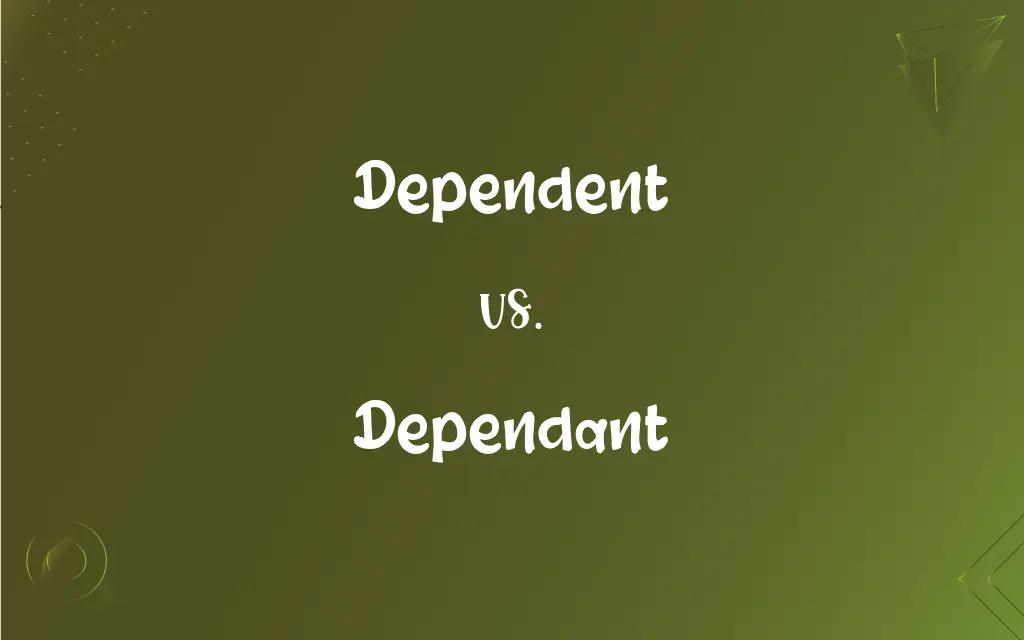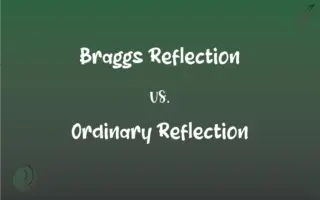Dependent vs. Dependant: What's the Difference?
Edited by Aimie Carlson || By Janet White || Published on June 22, 2024
"Dependent" is an adjective meaning reliant on something else, while "dependant" is a noun in British English for someone who relies on another for support.

Key Differences
"Dependent" as an adjective describes something that relies on or is determined by something else. It is used to indicate that one thing cannot exist or be understood without the other. For example, a plant's growth is dependent on sunlight and water. Conversely, "dependant" is a noun, primarily used in British English, that refers to a person who relies on another, especially for financial support. This could include children or elderly relatives who depend on a family member for their well-being.
In American English, "dependent" serves both as an adjective and as a noun, making "dependant" less commonly used. When "dependent" is used as a noun, it refers to someone who is supported by another person, typically in the context of tax filings or legal responsibility. For instance, parents might list their children as dependents on their tax returns. "Dependant," in regions where it is used, specifically retains its role as a noun without crossing into adjectival use, maintaining a clear distinction in purpose.
The choice between "dependent" and "dependant" can also reflect regional language preferences, with "dependant" being favored in British English. Despite this variance, the role of "dependent" as an adjective remains consistent, indicating a state of reliance or conditionality. The usage of "dependant" to specifically denote individuals who are supported by others underscores the importance of context in determining the correct term.
Understanding the difference between "dependent" and "dependant" is crucial for clear communication, especially in written English. "Dependent" can describe a wide range of relationships and conditions, from emotional or financial reliance to scientific variables. "Dependant," however, is narrowly defined, referring only to individuals who depend on someone else, reinforcing the importance of specificity in language.
The distinction between "dependent" and "dependant" highlights the nuanced nature of English vocabulary, where slight spelling differences can reflect variations in meaning, usage, and regional preferences. While "dependent" broadly covers conditions of reliance as both an adjective and a noun in American English, "dependant" serves a specific role, emphasizing the human aspect of dependency in contexts where it is used.
ADVERTISEMENT
Comparison Chart
Part of Speech
Adjective (also a noun in American English)
Noun (primarily British English)
Meaning
Reliant on something else; conditional
A person who relies on another, especially financially
Usage
Describes a condition or relationship of reliance
Refers to an individual who is supported by someone else
Regional Preference
Common in both American and British English
Favored in British English; less common in American English
Examples
"The outcome is dependent on several factors."
"She has two dependants under her care."
ADVERTISEMENT
Dependent and Dependant Definitions
Dependent
Determined or influenced by something else.
The success of the harvest is dependent on timely rains.
Dependant
A person who relies on another, especially a family member, for financial support.
As a single parent, she has two dependants to care for.
Dependent
Conditional upon.
Admission to the program is dependent upon passing the entrance exam.
Dependant
A person who relies on another for emotional support.
After the accident, he became a dependant of his friend, needing constant reassurance.
Dependent
Subordinate or subject to another's authority.
The colony was once dependent on the British Empire.
Dependant
An individual requiring guardianship or care due to disability or age.
The elderly man's brother is his legal dependant and caretaker.
Dependent
Relying on someone or something else for support.
He was dependent on his parents for financial assistance.
Dependant
A minor child or spouse entitled to support.
His insurance policy lists his spouse and children as dependants.
Dependent
A variable in an experiment that is affected by changes in another variable.
In our study, plant growth was the dependent measured to observe the effect of sunlight.
Dependant
A follower or subordinate of a powerful person, relying on their patronage.
In medieval courts, lords had many dependants who served them in return for protection and provisions.
Dependant
Determined, influenced, or controlled by something else.
Dependant
(Grammar) Subordinate to another clause, phrase, or word.
FAQs
What does dependent mean?
Dependent means reliant on something else, either as a condition or requirement.
How does context affect the use of dependent and dependant?
Dependent is used to describe a condition of reliance, while dependant specifically refers to a person in a support role.
Can dependent be used as a noun?
Yes, in American English, dependent can also refer to someone who relies on another, particularly for financial support.
Is dependant used in American English?
Less frequently; American English typically uses dependent for both the adjective and noun forms.
Can the spelling of dependent and dependant affect meaning?
Yes, the spelling signals the difference between describing a condition (dependent) and referring to a person (dependant).
Are there synonyms for dependent and dependant?
For dependent, synonyms include reliant and conditional. For dependant, synonyms include beneficiary and ward.
How do you determine whether to use dependent or dependant?
Consider whether you're describing a state of reliance (dependent) or referring to a person who is supported (dependant).
What is a dependant?
A dependant is a person who relies on another for support, especially financial.
Do tax forms influence the use of dependent and dependant?
Yes, especially in the U.S., where "dependent" is the term used on tax forms to refer to those financially supported.
Can dependent and dependant be used interchangeably?
Not correctly; their usage depends on whether you're describing a relationship or referring to a person.
How does British English differentiate between dependent and dependant?
British English more strictly adheres to using "dependent" as an adjective and "dependant" as a noun.
Is dependent always negative?
Not necessarily; it can simply denote a relationship of reliance without a negative connotation.
What are common contexts for using dependent?
Scientific research, emotional relationships, and financial support situations.
What are common contexts for using dependant?
Family law, insurance policies, and social welfare programs.
How does the legal definition of dependant vary?
It can include financial, care, and legal responsibility aspects, depending on jurisdiction.
Does the number of dependants affect financial assistance eligibility?
Yes, it can significantly impact tax deductions, welfare benefits, and insurance coverage.
Why is the distinction between dependent and dependant important?
It ensures clarity and precision in communication, especially in legal and financial contexts.
Can an object be a dependant?
No, dependant refers specifically to people who are supported by others.
Can pets be considered dependants?
Informally, yes, but legally they are usually considered property, not dependants.
How do technological tools handle the spelling of dependent and dependant?
Spell-checkers and grammar tools often adapt based on the set language preference, recognizing regional differences.
About Author
Written by
Janet WhiteJanet White has been an esteemed writer and blogger for Difference Wiki. Holding a Master's degree in Science and Medical Journalism from the prestigious Boston University, she has consistently demonstrated her expertise and passion for her field. When she's not immersed in her work, Janet relishes her time exercising, delving into a good book, and cherishing moments with friends and family.
Edited by
Aimie CarlsonAimie Carlson, holding a master's degree in English literature, is a fervent English language enthusiast. She lends her writing talents to Difference Wiki, a prominent website that specializes in comparisons, offering readers insightful analyses that both captivate and inform.






































































